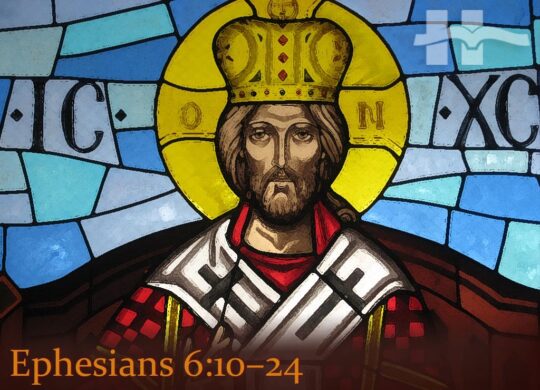Ephesians 6:10–24

Victory against supernatural foes is achieved by divine empowerment in the form of God’s armor (commitment and dependence upon God) and by Spirit-driven prayer.
It is not surprising that “power” occurs a number of times in this pericope: believers are “empowered” (Eph 6:10), so that they “may be able/may have power” (6:11) to stand against the devil, thus “being able/having power” (6:13) to resist in the evil day, and “being able/having power” (6:16) to extinguish the evil one’s missiles. All this power is absolutely necessary in battle because the opponents are “evil” (6:12, of hostile spiritual forces; 6:13, of the current age; and 6:16, of the devil). Without divine empowerment—divine armor—there can be no victory in this supernatural battle.
So, with 6:11, Paul begins to explain how one can “be empowered in the Lord, and in the strength of his might” (6:10), and that is by donning the “whole armor” of God (6:11, 13). It is clearly God’s own armor that is being given to his people. In fact, truth, righteousness, peace, and salvation—elements of the armor (Eph 6:14–16)—appear to be characteristics of God himself, divine virtues.
This is how the believer can stand—by donning, as instructed, these items of God’s armor: a belt of “truth,” a “breastplate of righteousness,” feet shod “with the preparation of the gospel of peace,” and a “shield of faith” (6:14–16). To be clad with “truth” is to be prepared with God’s truth—including the gospel—practically working out in the lives of God’s people. To don “righteousness” is to produce righteous fruit in life, as one lives by divine demand. In its broad sense, the gospel is the peace-inducing good news of God’s grand plan for consummating all things in Christ (1:10). God is going to win, his purposes are never going to be thwarted, his plans to consummate all things in Christ are indubitably coming to pass. The helmet-salvation relates to faith in this particular (and marvelous) work of God in Christ: the entire, sure, and guaranteed process of salvation of the child of God. The use of the sword-word is the deployment of Scripture against the attacks of the forces of darkness. All of these items of divine armor—belt-truth, breastplate-righteousness, shoe-peace, shield-faith, helmet-salvation, and sword-word—are the attributes (truth, righteousness), deeds (peace, faith, salvation), or utterances of God (word), underscoring the fact that without divine help in all these aspects, there can be no victory against powerful, supernatural foes.
Thus, the previous section dealt with the items of divine armor—in a sense, God’s operation in warfare. This underscores the fact of human dependence upon God in the entire endeavor. Therefore, unlike earlier commandments in Ephesians to “walk,” here we are asked only to “stand” with God’s armor, with God’s help.
But there is one thing we must do. So in 6:18–20, prayer is the focus—believers’ operation in warfare: “all” prayer at “all” times with “all” perseverance for “all” the saints. This then is the response of the child of God—prayer, in dependence upon God. Prayer is being given greater prominence in this martial context than any of the individual items of armor in the previous section. If Christians are to “stand” successfully in spiritual battles, the donning of God’s armor and, perhaps even more, the adoption of prayer as a lifestyle of alertness, in an attitude of constant dependence upon God, is critically important. It is indeed curious, that after all the echoes of “walking” in Ephesians (2:2, 10; 4:1, 17; 5:2, 8, 15), in this pericope believers are exhorted to “stand” (6:11, 13, 14; it shows up nowhere else in the letter) and, finally, they are (implicitly) called to kneel. Thus, the child of God remains unconquered by the dark forces of wickedness, by donning divine armor and by immersion in prayer.
[For more details, see my Ephesians commentary.]












 Abe Kuruvilla is the Carl E. Bates Professor of Christian Preaching at The Southern Baptist Theological Seminary (Louisville, KY), and a dermatologist in private practice. His passion is to explore, explain, and exemplify preaching.
Abe Kuruvilla is the Carl E. Bates Professor of Christian Preaching at The Southern Baptist Theological Seminary (Louisville, KY), and a dermatologist in private practice. His passion is to explore, explain, and exemplify preaching.